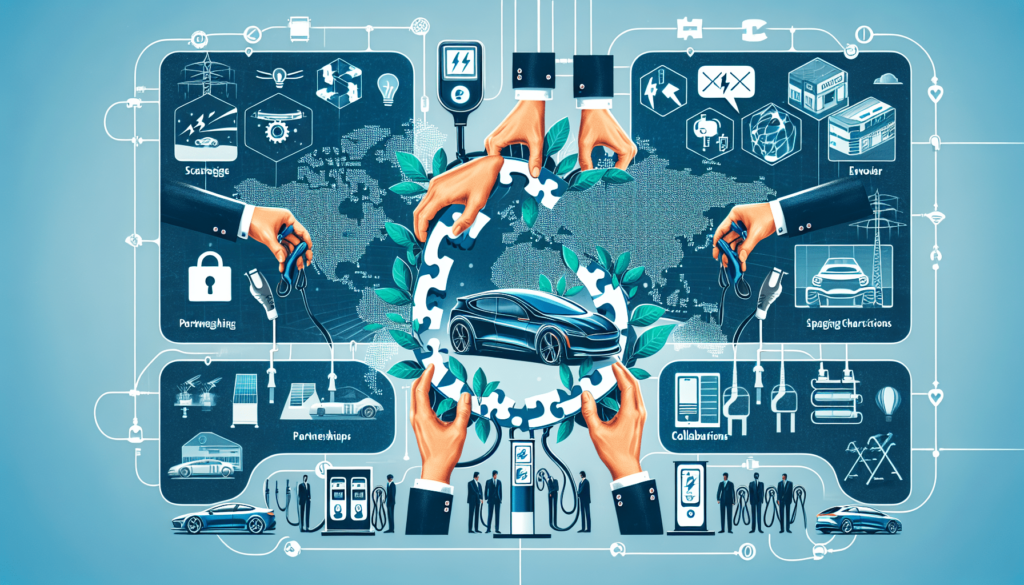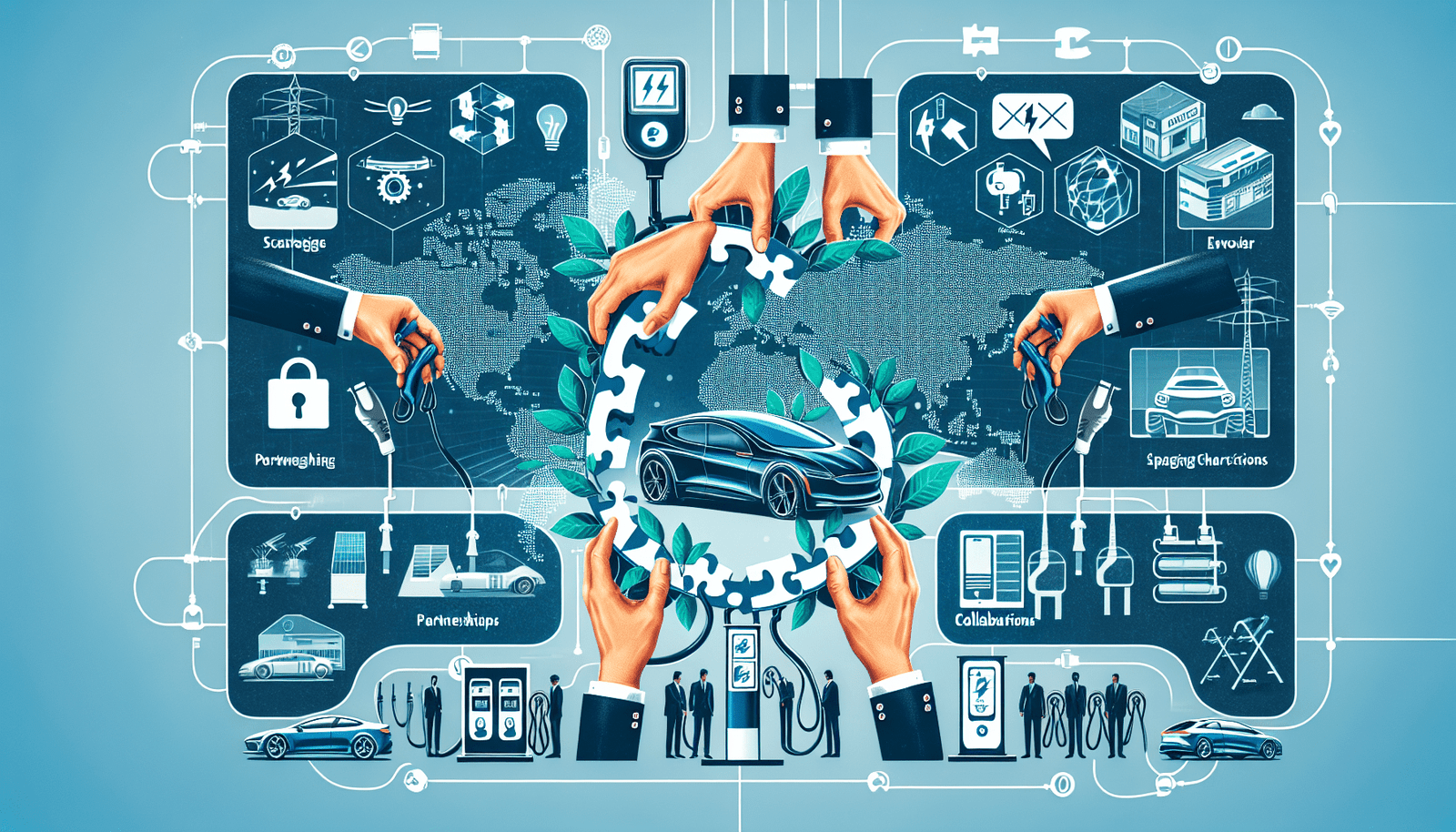In today’s fast-paced and eco-conscious world, the demand for electric vehicles is on the rise. As more and more people choose to embrace these clean and efficient modes of transportation, the question arises: how are electric vehicle manufacturers addressing the crucial issue of charging infrastructure? Well, it turns out that leading manufacturers are not only designing cutting-edge electric vehicles but are also actively working on solutions to ensure easy and convenient access to charging stations. By forging partnerships, investing in research and development, and promoting the expansion of charging networks, these manufacturers are paving the way for a future where electric vehicle owners can confidently hit the road without the fear of running out of power.

Collaboration with Charging Infrastructure Providers
Electric vehicle manufacturers understand the importance of collaboration with established charging companies to ensure a seamless charging experience for their customers. By partnering with companies that specialize in charging infrastructure, manufacturers can leverage their expertise to create a robust network of charging stations. This collaboration allows manufacturers to focus on their core competency of producing high-quality electric vehicles, while relying on the expertise of charging infrastructure providers to handle the installation and maintenance of charging stations.
Investing in charging network infrastructure
To support the growth and adoption of electric vehicles, manufacturers are heavily investing in charging network infrastructure. This involves not only the physical installation of charging stations but also the development of supporting infrastructure such as power distribution systems and grid integration solutions. By investing in charging network infrastructure, manufacturers aim to create a comprehensive and reliable charging ecosystem that can meet the increasing demands of electric vehicle owners.
Developing proprietary charging technology
To differentiate themselves in the market, electric vehicle manufacturers are actively developing proprietary charging technology. This technology goes beyond the standard charging protocols and allows for faster and more efficient charging. By developing their own charging technology, manufacturers can provide unique charging solutions that cater specifically to their vehicles, enhancing the overall charging experience for their customers.
Expansion of Charging Network
To cater to the growing number of electric vehicles on the road, manufacturers are taking steps to expand the charging network. Increasing the number of charging stations is a top priority, ensuring that electric vehicle owners have convenient access to charging infrastructure wherever they go. Manufacturers are also strategically deploying charging stations at key locations such as highways, shopping centers, and urban areas to provide maximum accessibility and convenience to their customers.
Designing fast-charging stations for rapid charging
One of the key challenges in electric vehicle adoption is the time it takes to charge the vehicle. To address this challenge, manufacturers are designing fast-charging stations that enable rapid charging. These stations utilize high-power charging technology and can significantly reduce charging times, allowing electric vehicle owners to spend less time waiting for their vehicles to charge. By investing in fast-charging infrastructure, manufacturers are eliminating one of the major barriers to electric vehicle adoption.
Integration of Charging Solutions in EV Models
Electric vehicle manufacturers are integrating charging solutions directly into their vehicle designs. This involves embedding charging stations into the vehicles themselves, allowing for seamless and convenient charging experiences. Additionally, manufacturers are developing wireless charging capabilities, allowing vehicles to charge without the need for physical connections. These advancements in charging technology enhance the overall user experience and make charging an electric vehicle as effortless as possible.
Implementing advanced charging management systems
To streamline the charging process and optimize charging efficiency, manufacturers are implementing advanced charging management systems. These systems allow for intelligent charging scheduling, load balancing, and real-time monitoring of charging sessions. By leveraging advanced charging management systems, manufacturers can ensure that their customers have a hassle-free and reliable charging experience, while also optimizing the use of energy resources.
Enhancing User Experience
Electric vehicle manufacturers understand the importance of providing a seamless and convenient user experience for their customers. To achieve this, manufacturers are developing mobile apps and platforms that allow users to easily locate and reserve charging stations. These apps provide real-time information on the availability of charging stations, helping users plan their charging needs more effectively. Additionally, manufacturers are integrating payment systems into these platforms, allowing for a convenient and cashless charging experience.
Collaboration with Governments and Municipalities
To accelerate the deployment of charging infrastructure, manufacturers are actively collaborating with governments and municipalities. This collaboration involves working closely with local authorities to install public charging stations in key locations such as parking lots, residential areas, and commercial centers. Additionally, manufacturers are acquiring the necessary permits and approvals for charging station deployment to ensure compliance with local regulations. By partnering with governments and municipalities, manufacturers can leverage their support and resources to establish a robust and widespread charging network.
Supporting development of charging infrastructure policies and regulations
Electric vehicle manufacturers also play a crucial role in supporting the development of charging infrastructure policies and regulations. They work closely with government agencies, industry associations, and other stakeholders to establish standards and guidelines for charging infrastructure. By participating in international forums, manufacturers contribute to the harmonization of charging protocols and promote interoperability between different charging networks. This collaboration helps create a unified and standardized charging infrastructure, ensuring a seamless experience for electric vehicle owners.
Investment in High-Power Charging Technology
To enable faster and more efficient charging, manufacturers are investing in high-power charging technology. Research and development efforts are focused on developing charging solutions that can deliver high charging rates without compromising battery health and durability. Manufacturers are also investing in next-generation battery technology, such as solid-state batteries, which have the potential to significantly reduce charging times. Additionally, manufacturers are collaborating with energy companies to ensure seamless integration of high-power charging infrastructure with the electrical grid.
Promotion of Home Charging Solutions
Recognizing the convenience and cost-effectiveness of home charging, manufacturers are actively promoting the adoption of home charging solutions. They offer incentives and subsidies to encourage customers to install home charging stations, making it more affordable and accessible. Manufacturers also provide consultation and support services to help customers set up their home charging infrastructure. By educating customers on the benefits of home charging, manufacturers aim to increase the adoption of this convenient charging option.
Integration with Renewable Energy Sources
Electric vehicle manufacturers are committed to promoting sustainable and clean charging solutions. They are actively developing infrastructure for charging stations powered by renewable energy sources such as solar and wind. By partnering with renewable energy providers, manufacturers can ensure that their charging network is powered by clean energy, reducing the environmental impact of charging electric vehicles. Additionally, manufacturers encourage the use of solar panels for home charging, enabling customers to charge their vehicles using renewable energy generated on-site.
Standardization of Charging Infrastructure
To ensure compatibility and interoperability between different charging networks, manufacturers collaborate with industry associations and participate in international forums to establish charging standards. These standards define the technical specifications and protocols for charging infrastructure, ensuring that electric vehicles can be charged across different networks. Manufacturers actively contribute to the development of these standards, working towards a unified and seamless charging experience for all electric vehicle users.
Addressing Range Anxiety
One of the concerns that potential electric vehicle owners have is range anxiety – the fear of running out of battery power while on the road. To alleviate this concern, manufacturers are continuously improving battery technology to increase the range of electric vehicles. By developing advanced battery chemistries and optimizing battery management systems, manufacturers are able to offer electric vehicles with longer driving ranges, reducing the likelihood of range anxiety.
Manufacturers are also developing fast-charging solutions that allow for quick top-ups, enabling electric vehicle owners to quickly and easily replenish their battery levels when needed. Additionally, manufacturers provide range-assistance services, such as roadside assistance and navigation systems that help stranded electric vehicle owners locate nearby charging stations or alternative routes to reach their destination. By addressing range anxiety, manufacturers are making electric vehicles a viable and reliable transportation option for consumers.

